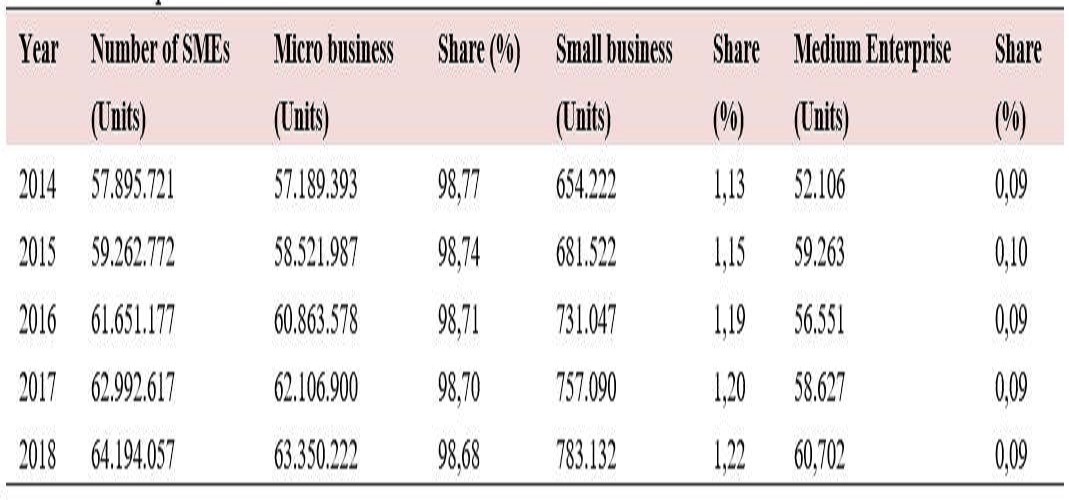Export Contribution of Micro, Small and Medium Enterprises to GDP Per capita in Indonesia
Abstract
This study will determine how much the influence of the exchange rate, the number of MSMEs, investment, credit, and inflation on MSME exports nationally, and how they contribute to GDP per capita. The research method uses multiple regression with data transformation ln. The results of the study consist of model 1, the exchange rate factor, the number of MSMEs, investment, credit, and inflation are variables that influence increasing the number of product exports produced from the MSME sector. In the second model, the contribution of MSME exports to GDP per capita. The results showed that of all significant positive variables and one significant negative variable. The investment required in Indonesia, whose number continues to increase yearly, affects the high number of products exports from the MSME sector.
For this reason, investment factors must continue to be considered to increase MSME exports. In contrast, the contribution of the inflation variable has a significant negative effect, which is an inverse relationship to MSME exports. It is predicted that if inflation is low, MSME exports will increase, and vice versa if inflation is high, MSME exports will decline. Furthermore, model 2 shows that MSME exports significantly contribute to gross domestic product per capita. In this case, the ups and downs of Micro, Small, and Medium Enterprises' exports need special attention.
References
Akalpler, E. (2013). Does Inflation Increase the Export? Case Study Turkey. Theoretical and Practical Research in Economic Fields, 4(2).
Akoto, W. (2016). On the Nature of the Causal Relationships Between Foreign Direct Investment, GDP and Exports in South Africa. Journal of International Development, 28(1). https://doi.org/10.1002/jid.2892
Dincer, N., & Kandil, M. (2011). The effects of exchange rate fluctuations on exports: A sectoral analysis for Turkey. Journal of International Trade and Economic Development, 20(6). https://doi.org/10.1080/09638190903137214
Flatten, T. C., Greve, G. I., & Brettel, M. (2011). Absorptive capacity and firm performance in SMEs: The mediating influence of strategic alliances. European Management Review, 8(3). https://doi.org/10.1111/j.1740-4762.2011.01015.x
Gounder, N., & Sharma, P. (2012). Determinants of bank net interest margins in Fiji, a small island developing state. Applied Financial Economics, 22(19). https://doi.org/10.1080/09603107.2012.674202
Gujarati, D. (2014). Dasar-dasar Ekonometrika. In Dasar-dasar Ekonometrika.
Katua, N. T. (2014). The Role of SMEs in Employment Creation and Economic Growth in Selected Countries. International Journal of Education and Research, 2(12).
Mahmoodi, M., & Mahmoodi, E. (2016). Foreign direct investment, exports and economic growth: Evidence from two panels of developing countries. Economic Research-Ekonomska Istrazivanja, 29(1). https://doi.org/10.1080/1331677X.2016.1164922
Mankiw, N. G. (2003). Teori Makro Ekonomi Terjemahan. In Jakarta: PT. Gramedia Pustaka Utama.
Patty, R., & Kuncoro, M. (2016). The linkage between industrialization, urbanization, and tourism: lessons from asean and indonesia. International Journal of Business, Economics and Law, 11(3).
Rajput, N., Rajput, A., Batra, G., & Oberoi, S. (2012). Relationship of exports, Forex and MSMEs in India: An econometric study. Problems and Perspectives in Management, 10(3).
Ratnasih, C. (2018). Institutional bureaucracy and real sector movement. European Research Studies Journal, 21(4). https://doi.org/10.35808/ersj/1101
Rosyadi, I., & Ratnasih, C. (2021). The Economic Structure and Employment Opportunities (Cases in Bengkulu, Indonesia). European Journal of Business and Management Research, 6(5). https://doi.org/10.24018/ejbmr.2021.6.5.1074
Saini, B., & Raghuveer, S. R. (2014). An Empirical Study on Export Financing (Awareness, Impact and Satisfaction) among Handicraft Export Firms in India. Pacific Business Review International.
Thomas, K. N. (2014). The Role of SMEs in Employment Creation and Economic Growth in Selected Countries. International Journal of Education and Research, 2(12).
Zulher, & Ratnasih, C. (2021). Financial development and poverty reduction in developing countries. Accounting, 7(3). https://doi.org/10.5267/j.ac.2020.12.010


This work is licensed under a Creative Commons Attribution 4.0 International License.
Copyright for this article is retained by the author(s), with first publication rights granted to the journal.
This is an open-access article distributed under the terms and conditions of the Creative Commons Attribution license (http://creativecommons.org/licenses/by/4.0/).








1.png)














